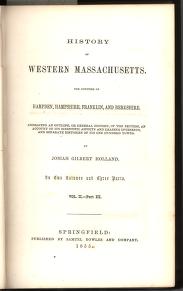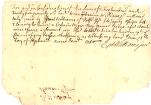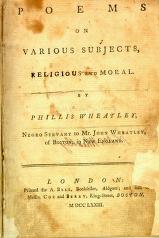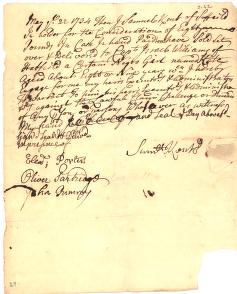|

"Bars Fight"

Bill of sale for slave named Prince

Advertisement in "The Boston Weekly Post-Boy" newspaper

"Poems on Various Subjects, Religious and Moral"

Bill of sale for slave named Kate
|
Summary and Objective
Students will hear and discuss the picture book, A VOICE OF HER OWN, THE STORY OF PHILLIS WHEATLEY, SLAVE POET, by Kathryn Lasky. They will examine documents on the web site and create a written document of their own. Through the activities, students will understand that people, like Phyllis Wheatley, who experienced slavery, have shown exemplary qualities that made them admirable. They will begin to understand that the feelings the colonists experienced during the pre-revolutionary period of enslavement toward England, had similarities to those of slaves owned by the colonists. Students will also show an understanding of the importance of written and oral histories in helping us learn about our past. This knowledge helps us to build tolerance and to accept differing points of view. It is expected that this activity will follow other stories and discussions about the time period, and the qualities and accomplishments of important people.
Teaching Plan
Step 1.
Read the story, A VOICE OF HER OWN, THE STORY OF PHILLIS WHEATLEY, SLAVE POET. Discuss the events and beautiful illustrations by Paul Lee.
Step 2.
Review the events that led to Phyllis Wheatley becoming a slave and discuss what happened to different slaves, especially in the Northeast. Show pictures from the web site. (Advertisement in "The Boston Weekly Post-Boy"-a runaway slave ad from 1749, Bill of Sale for Slave Named Kate, 1734, and Bill of Sale for Slave Named Prince) Help students reflect on previous knowledge as well as new information.
Step 3.
Compare slavery with the feeling of enslavement felt by the colonists toward England during this time.
Step 4.
Phyllis Wheatley showed qualities that made her admirable. Discuss these qualities and achievments. Show "Poems of various Subjects" from the American Centuries website.
Step 5.
Introduce the site, "Bars Fight". Make a comparison between this account and the poems of Phyllis Wheatley.
Step 6.
Post-activity: children will write a poem or narrative in their voice, about an important event that has happened in their life time. Older students could write about a historical event from another time period as if they were present during the time. Illustrate the event with pictures that accurately represent the time. Stories should be shared with the class. Students can explain why they chose a particular event and its importance in history.
|




